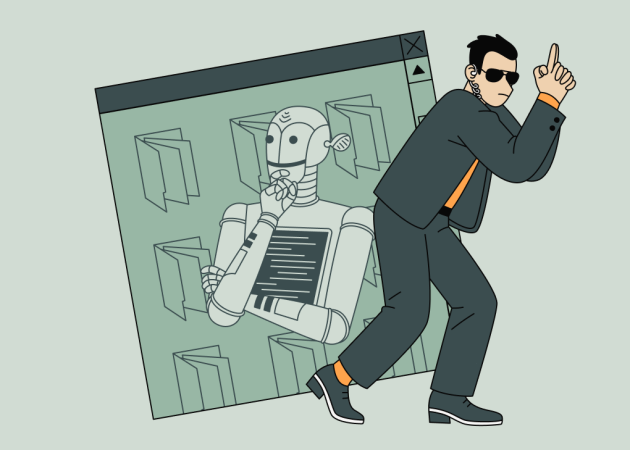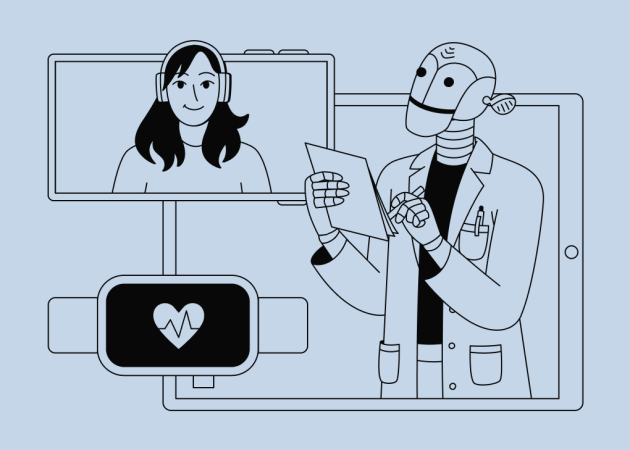Contents
Contents
Artificial intelligence is, without exaggeration, transforming the educational sector, making it possible to finally shift from old-school textbooks to engaging techniques tailored to different learning needs.
No wonder the AI in education market is expected to reach $12.8 billion by 2028. Opportunities like personalized learning and intelligent learning assistants are no longer bonus features but a necessity for EdTech products to retain users. Therefore, it makes sense for executives in the field to enhance their in-house teams with tech experts specifically working with AI.
A fundamental understanding of essential EdTech AI developers’ skills, the salary ranges for various roles in AI, and cooperation options can help organizations achieve cost efficiency while making full use of AI technologies. And that is precisely what we focus on in this article.
Essential Skills of Top-Notch EdTech AI Developers
Software development is inherently dynamic, and the extremely rapid evolution of AI technology has led to continuously growing demands for skill development.
Nonetheless, certain fundamental criteria are important for AI developers across various expertise niches — and EdTech executives must pay attention to them when scaling their teams.
Technical Artificial Intelligence Skills
AI encompasses several skill sets, therefore, depending on the role, developers working with the technology need to be adept at ML, data science, data engineering, specific programming languages, etc.
Typically, the foundation for working with artificial intelligence is a solid knowledge of popular AI and ML frameworks, including TensorFlow, PyTorch, and scikit-learn. These frameworks provide the tools and libraries necessary for developing algorithms, recommendation systems, and data analysis pipelines that power AI-based platforms.
As for programming languages, AI developers involved in coding processes are usually proficient in Python, Java, and C++. Python is of the highest priority here due to its versatility and rich ecosystem of libraries and frameworks tailored for ML and AI-related tasks.
Additionally, data science roles might require knowledge of R programming language since it offers statistical and data analysis capabilities necessary for data preprocessing, visualization, and advanced statistical modeling.
Regarding data management, developers in AI are often skilled in data preprocessing techniques because data quality and readiness directly impact the effectiveness of AI algorithms in EdTech products.
Data preprocessing involves cleaning, transforming, and structuring raw data to ensure it is accurate, consistent, bias-free, and thus suitable for machine learning. It may also include feature engineering, where developers create new data features to improve the AI model’s ability to make predictions or provide personalized recommendations, thus improving the digital educational experience.
Last but not least, developers in AI must have strong mathematical and statistical skills to understand the underlying mechanisms of AI models. The answers to most AI-related problems can be found in calculus, linear algebra, statistics, and probability theory. Therefore, the knowledge of these disciplines is crucial for addressing complex issues in AI, optimizing algorithms, and ensuring that AI systems are accurate and robust.

Domain Expertise
Effective integration of AI into EdTech products goes beyond technical proficiency and requires an in-depth understanding of the education sector’s unique requirements. The educational process is based on a unique combination of pedagogical principles, curriculum design fundamentals, learning objectives, and student needs. Without this knowledge, AI developers might not be able to create solutions that align with the project’s goals and hinder the learning experience it aims to provide.
For instance, one of the most significant benefits of integrating AI into the educational process is the opportunity for personalized learning. However, providing customized learning experiences for individual users is a complicated task. It requires advanced algorithms that can adapt content, pacing, and assessments to cater to diverse learning styles and abilities. Therefore, EdTech AI developers should have a basic understanding of cognitive psychology and educational theories to implement practical personalization algorithms.
Since one of Beetroot’s focus industries is EdTech, we typically provide our clients with software development specialists who already have experience working in the sector and are passionate about making impactful educational products.
Soft Skills
Apart from the tech skills required for AI development, we find it crucial to highlight the emotional intelligence skills essential for EdTech AI developers.
First and foremost, AI specialists in the field must be effective communicators to collaborate with the development team, which often comprises software developers, AI engineers, data scientists, UI/UX designers, and more. Besides, AI developers might also need to work closely with intended users — educators, students, and other stakeholders — to understand their needs and thus bring more value to their AI-powered solutions.
Other vital skills required for AI engineers include adaptability and problem-solving. The EdTech AI field is constantly evolving, and specialists working in this niche must be open to change and ready to learn new technologies and methodologies (hence the need for adaptability). And since AI development is complex and highly dynamic, there might not always be answers that are easy to search for. Therefore, specialists working with artificial intelligence must be creative and have strong problem-solving skills.
Understanding the AI Developer Salary Landscape
According to the 2022 NewVantage survey, 91% of top businesses surveyed reported ongoing investments in AI. After the rise of tools like ChatGPT, small and medium companies will likely follow the example of leading enterprises.
Naturally, the demand for AI professionals also continues to rise, affecting the job market. EdTech business executives need to gain insights into the artificial intelligence talent market and the salary landscape in order to attract and retain skilled AI engineers. Here are the most significant factors that affect salary formation in the AI field:
- Education and experience: EdTech AI developers with advanced degrees in computer science, AI, or related fields and experience in the AI field typically call for higher salaries.
- Specialization: Developers with niche expertise in AI subfields, such as natural language processing (NLP) or computer vision, can expect higher salaries since such narrow specializations allow them to address unique challenges within the education sector effectively.
- Location: Depending on the geographical location of AI engineers, their salaries can differ drastically. For instance, an EdTech AI developer’s salary in the US (especially in Silicon Valley’s tech hubs) can be three times higher than in Poland due to different costs of living and competition levels.
- Company size and reputation: Established EdTech enterprises typically offer higher salaries than emerging startups in the field because of larger budgets for innovation.
Salary Range for Key AI Roles
Taking into account the factors mentioned above, we can now answer the second key question of the article: How much do AI programmers make? To do that, we researched four critical roles in AI development, categorizing the salary range by geographical location and expertise level.
Python developer: Creating software applications using the Python programming language, writing code, developing algorithms, and integrating Python libraries to enable AI and ML functionalities in EdTech products.
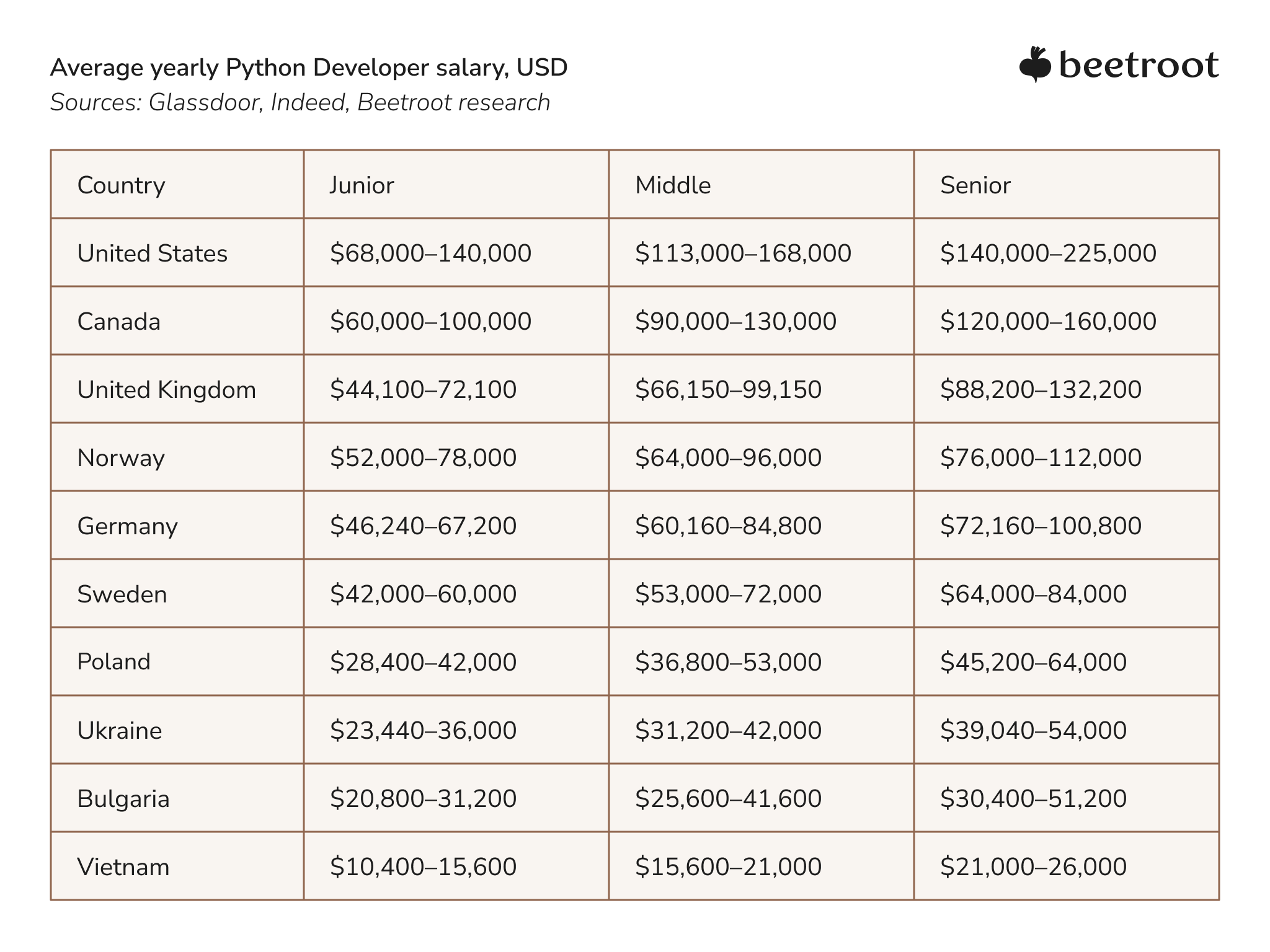
ML engineer: Designing and deploying machine learning models, optimizing them for performance, scalability, and efficiency, and ensuring they integrate seamlessly with the EdTech platform.
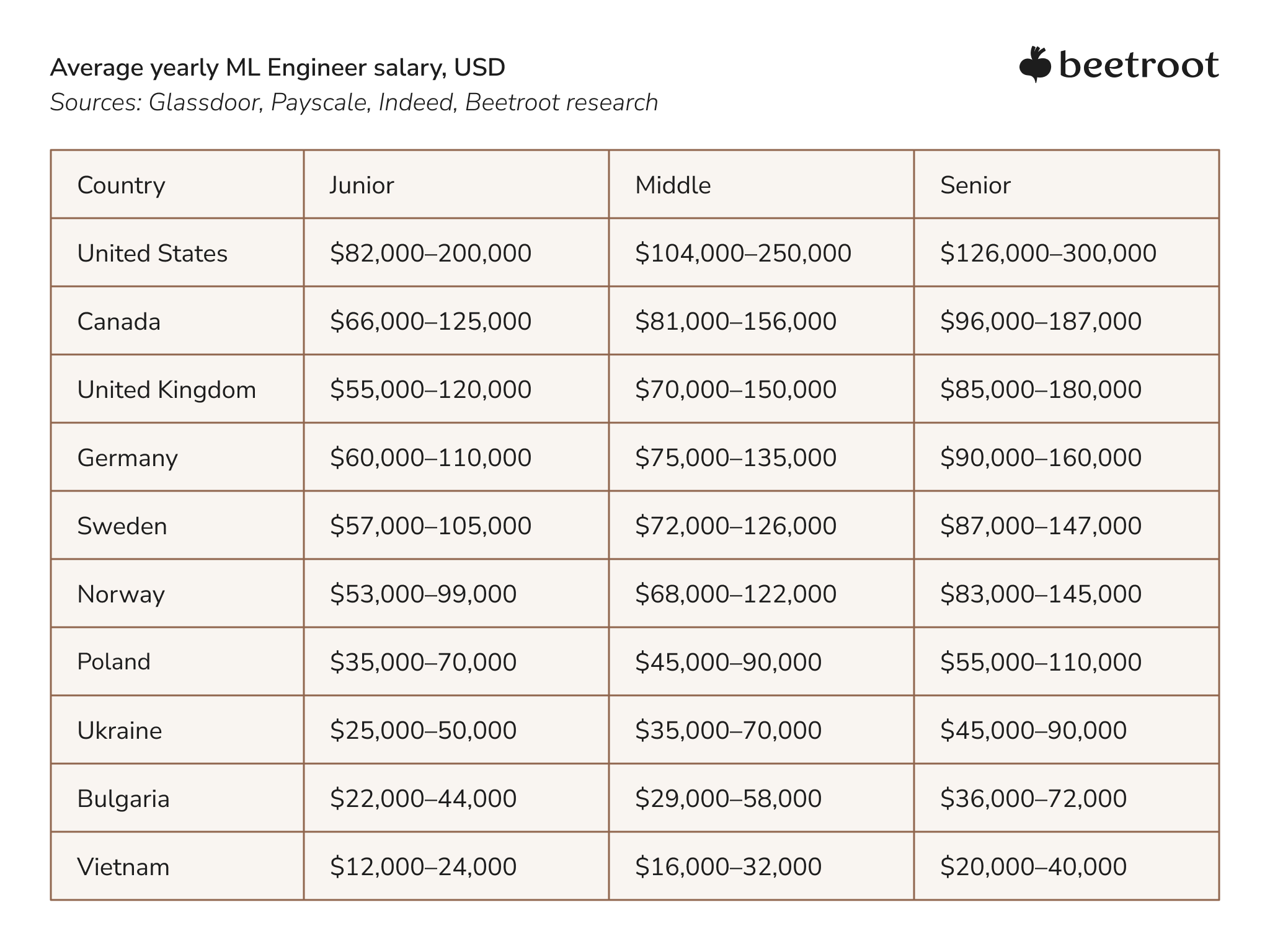
Data scientist: Working with data analysis, cleaning, and feature engineering, using statistical techniques to derive insights from educational data and collaborating closely with ML engineers to prepare high-quality data for AI models in EdTech.
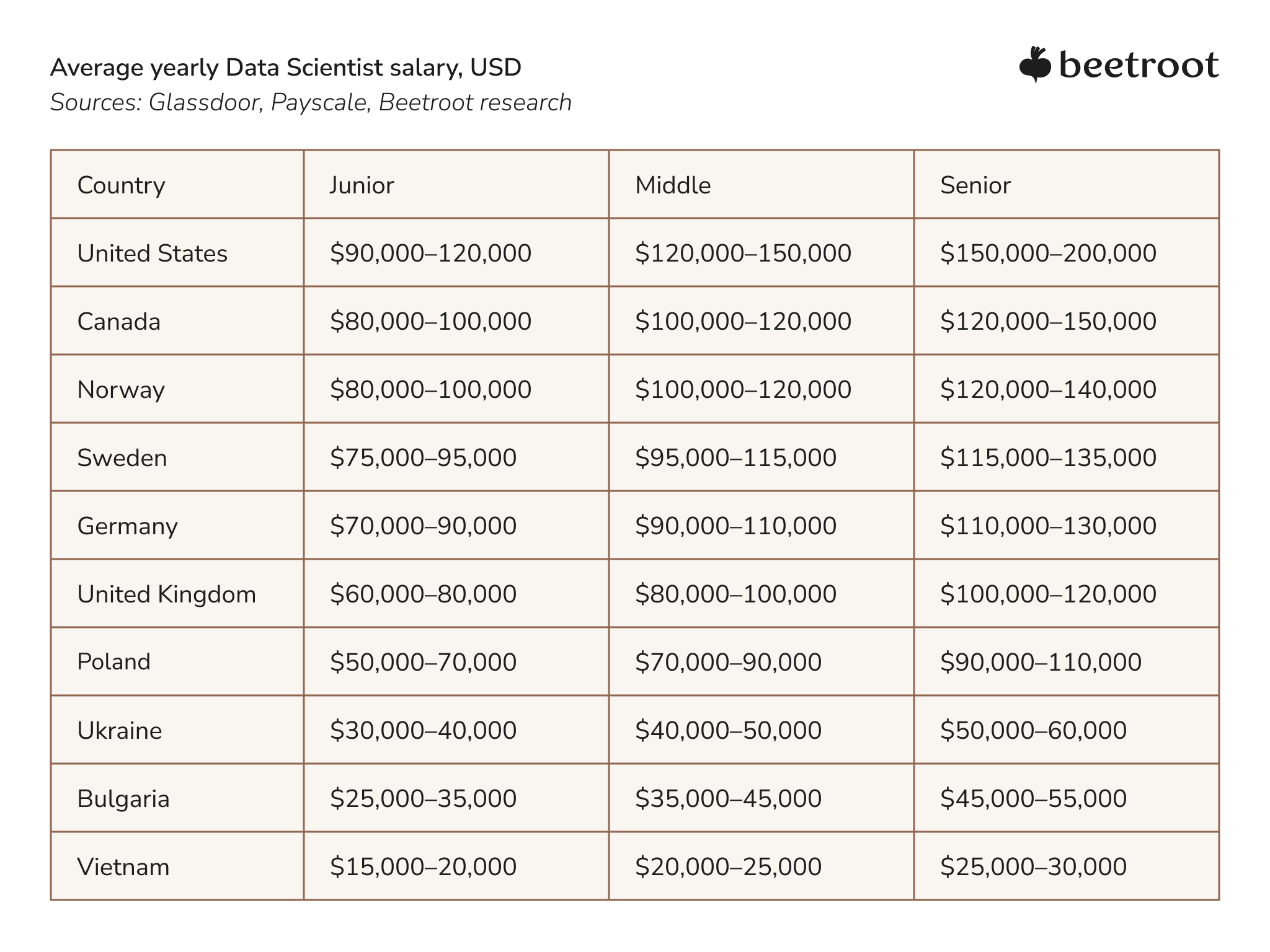
Data annotator: Labeling and annotating educational data, ensuring it is accurately categorized and structured for machine learning, and helping improve model accuracy and performance in EdTech applications.
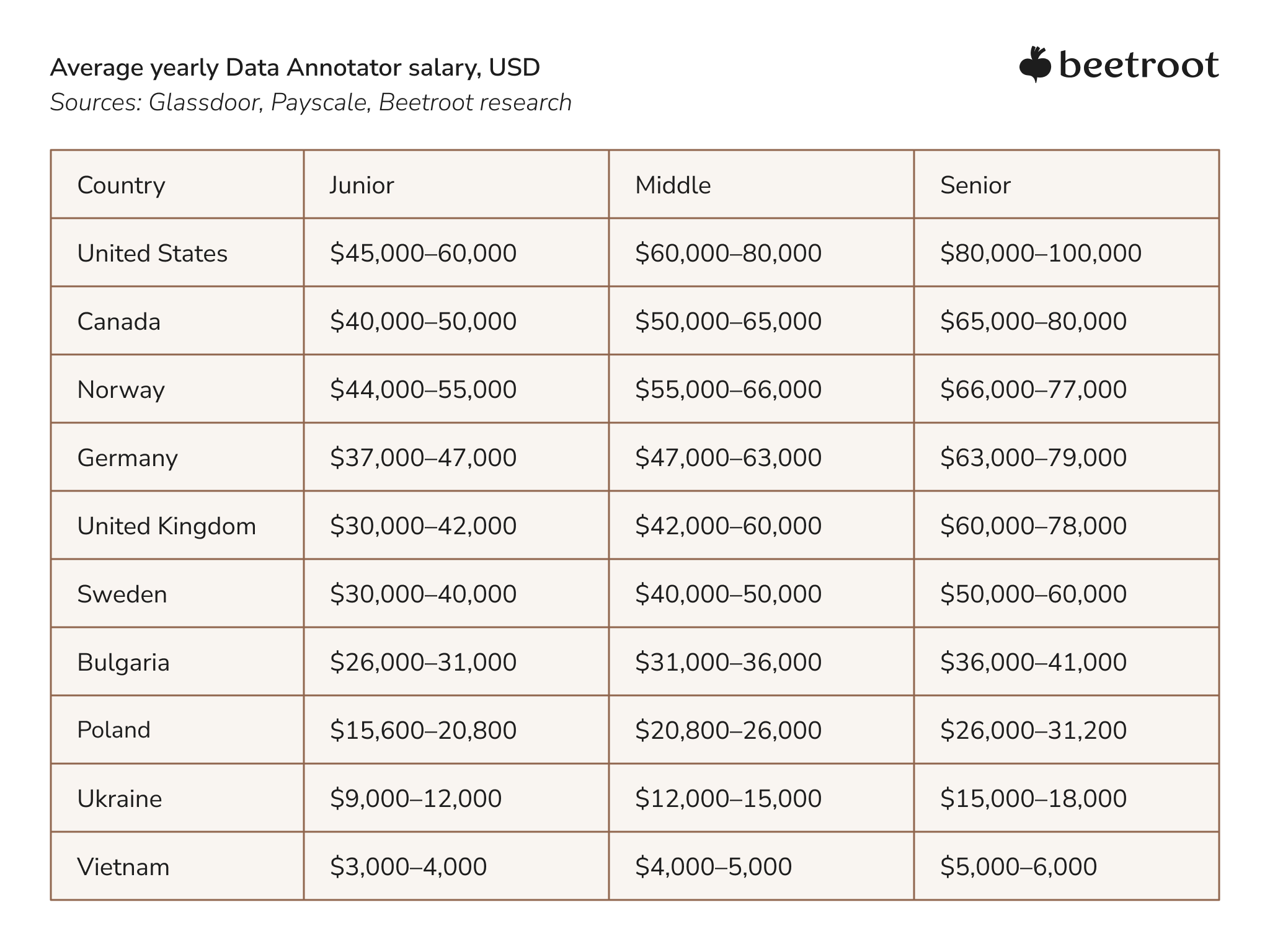
The Value of Team Augmentation in EdTech AI Development
Despite the growing demand, AI expertise remains relatively scarce, meaning EdTech companies must not only offer a competitive salary but also provide compelling compensation packages. These often include performance-based bonuses, benefits packages like health insurance and retirement plans, and even stock options. Moreover, experienced AI engineers who choose from multiple job offers will likely go for a company that fosters a supportive work environment and healthy work-life balance and assists its employees in professional development.
In some cases, building an in-house tech team to handle AI-related tasks is a necessity. However, if the specifics of your project allow for cooperation with a remote augmented team, this option can be more cost-effective and bring unique advantages to the table.
The core benefits of working with remote teams include:
- Access to global talent pool: While EdTech AI developers might be hard to find locally, companies can tap into a broader range of remote specialists with the desired AI engineering skills. In addition to making the search easier, the diversity of such teams can help companies leverage the fresh perspectives that AI engineers from around the world have to offer.
- Cost reduction: Working with remote teams means your company doesn’t have to pay for an office space and the expenses that come with it. Besides, if you outsource AI developers, your company won’t be the one offering competitive benefits packages and bonuses.
- Scalability and flexibility: Assembling a skilled in-house team is quite time-consuming due to a lengthy recruitment and onboarding process. With the augmented remote team model, the outsourced company is responsible for the hiring process and is usually prepared to quickly adjust the team size and composition to your project demands.

Tips for Ensuring a Positive Remote Team Engagement
Whether your organization works with an in-house or outsourced remote team, fostering team engagement in AI software development projects is crucial because it promotes effective collaboration, communication, and project alignment. As a result, this approach helps boost productivity and ensures that teams work cohesively to meet project goals and deadlines, regardless of the distance. The following practices are the core of constructive collaboration with remote teams:
- Rigorous vetting processes: It’s perfectly normal to have high standards both for the project and the team implementing it. At Beetroot, we put in a lot of effort to make sure the specialists we hire for the EdTech projects are a good fit in terms of technical skills, experience, and values.
- Cultural alignment: From Beetroot’s experience with the EdTech sector, companies in this field strive to make education more accessible and inclusive, personalizing the learning process to different needs. Therefore, for effective collaboration, it’s essential that all the stakeholders involved, including the remote team, should be on the same page in terms of fundamental values and goals.
- Clear communication: To make the collaboration as efficient as possible, it’s essential to establish communication guidelines from the start, use collaboration tools and project management software, have regular video calls, and encourage proactive reporting and honest feedback.
Finding the Right Consulting Partner to Guide AI Strategy and Implementation
AI technology adoption has several tech and ethical challenges. While EdTech companies typically have deep knowledge of education nuances, they can increase their chances of successful AI strategy implementation with an experienced consulting partner by their side. When chosen wisely, such consulting partners can provide invaluable insights and help create effective AI strategies aligning with the project’s educational objectives.
Here are the three steps that will help you make sure your organization and a consulting partner can create a transformative synergy:
- Assess expertise and experience: When considering a consulting partner for EdTech AI development, evaluate their expertise and experience in both AI and the education sector. In addition to conducting interviews, check out their previous projects in the field and ask for references.
- Look for comprehensive services: A consulting partner offering various services, from strategy development to implementation and ongoing support, can provide a holistic approach to the AI development process and help you adjust the team composition along the way.
- Ensure the partner’s alignment with your organization’s vision: Successful collaboration requires following the same long-term objectives, so we recommend EdTech executives discuss the project vision with a prospective partner for a meaningful AI strategy implementation.
Transforming Education Through Strategic Partnerships
Artificial intelligence holds the potential to revolutionize education, making it globally accessible, inclusive, and impactful. To leverage this potential, EdTech companies require reliable partners with broad AI expertise and commitment to fostering innovation within the industry.
Attracting and retaining top EdTech AI partners can be a significant investment. However, it is not a luxury but a strategic imperative. EdTech executives who recognize the value of strategic partnerships propel business growth and contribute to the advancement of education itself.
It’s worth noting that there are multiple partnership options for projects with different goals and budgets. When assembling an in-house team of AI specialists becomes inefficient, EdTech executives can turn to other cooperation models like outsourcing and team augmentation.
With expertise in EdTech and AI technology, Beetroot is always happy to assist businesses with similar values to create meaningful software products that benefit the education sector. So, if your EdTech company is looking for a strategic partner to enhance your projects with AI expertise — contact us for a consultation.
Subscribe to blog updates
Get the best new articles in your inbox. Get the lastest content first.
Recent articles from our magazine
Contact Us
Find out how we can help extend your tech team for sustainable growth.

